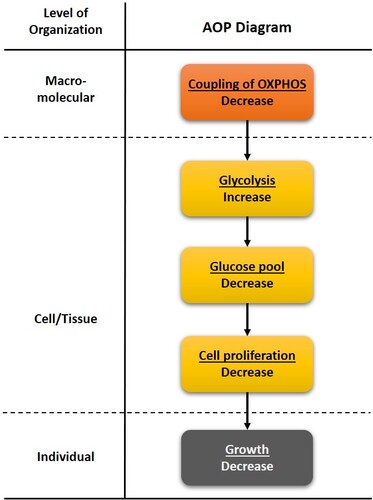
This AOP is licensed under the BY-SA license. This license allows reusers to distribute, remix, adapt, and build upon the material in any medium or format, so long as attribution is given to the creator. The license allows for commercial use. If you remix, adapt, or build upon the material, you must license the modified material under identical terms.
AOP: 267
Title
Uncoupling of oxidative phosphorylation leading to growth inhibition via glucose depletion
Short name
Graphical Representation

Point of Contact
Contributors
- You Song
Coaches
- Dan Villeneuve
OECD Information Table
| OECD Project # | OECD Status | Reviewer's Reports | Journal-format Article | OECD iLibrary Published Version |
|---|---|---|---|---|
| 1.92 | Under Development |
This AOP was last modified on April 29, 2023 16:03
Revision dates for related pages
| Page | Revision Date/Time |
|---|---|
| Decrease, Coupling of oxidative phosphorylation | November 07, 2025 05:15 |
| Increase, Glycolysis | November 01, 2022 16:25 |
| Decrease, Glucose pool | November 01, 2022 16:27 |
| Decrease, Cell proliferation | December 07, 2020 06:55 |
| Decrease, Growth | July 06, 2022 07:36 |
| Decrease, Coupling of OXPHOS leads to Increase, Glycolysis | November 01, 2022 16:28 |
| Increase, Glycolysis leads to Decrease, Glucose pool | November 01, 2022 16:28 |
| Decrease, Glucose pool leads to Decrease, Cell proliferation | November 01, 2022 16:28 |
| Decrease, Cell proliferation leads to Decrease, Growth | July 06, 2022 07:43 |
Abstract
The proposed project aims to develop a network of AOPs for mitochondrial uncoupler mediated adverse effects on aquatic organisms.
AOP Development Strategy
Context
The mitochondrion is central for diverse types of physiological processes, such as energy production, cell cycle regulation, lipid metabolism and ion homeostasis. Mitochondrial dysfunction has frequently been reported as a common (eco)toxicological effect induced by a wide range of environmental stressors through direct or indirect modes of action (Meyer et al., 2013). Chemical mediated mitochondrial dysfunctions are tightly associated with various diseases in human, such as neurodegeneration, cardiovascular malfunction, diabetes and cancer, and multiple types of effects in wildlife, such as metabolic disorders, growth arrest, developmental abnormalities, reproduction failure, mortality and population decline (Meyer et al., 2013). Several mitochondrial dysfunction related MIEs have been well characterized, such as uncoupling of oxidative phosphorylation (OXPHOS) and inhibition of specific protein complexes in the mitochondrial electron transport chain. These MIEs commonly affect the mitochondrial membrane potential and ATP synthetic processes, induce reactive oxygen species (ROS) and oxidative damage to DNA, protein and lipid, modulate plasma membrane ion transporter activities and trigger programmed cell death.
Strategy
Summary of the AOP
Events:
Molecular Initiating Events (MIE)
Key Events (KE)
Adverse Outcomes (AO)
| Type | Event ID | Title | Short name |
|---|
| MIE | 1446 | Decrease, Coupling of oxidative phosphorylation | Decrease, Coupling of OXPHOS |
| KE | 2070 | Increase, Glycolysis | Increase, Glycolysis |
| KE | 2071 | Decrease, Glucose pool | Decrease, Glucose pool |
| KE | 1821 | Decrease, Cell proliferation | Decrease, Cell proliferation |
| AO | 1521 | Decrease, Growth | Decrease, Growth |
Relationships Between Two Key Events (Including MIEs and AOs)
| Title | Adjacency | Evidence | Quantitative Understanding |
|---|
Network View
Prototypical Stressors
Life Stage Applicability
Taxonomic Applicability
Sex Applicability
Overall Assessment of the AOP
Domain of Applicability
Essentiality of the Key Events
Evidence Assessment
Known Modulating Factors
| Modulating Factor (MF) | Influence or Outcome | KER(s) involved |
|---|---|---|